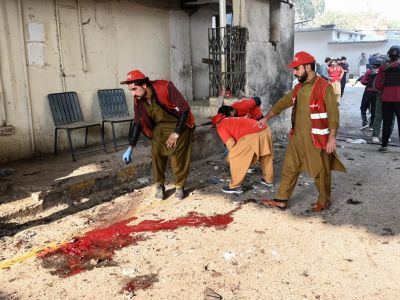The United States and Egypt on Friday mulled new ideas for resolving the current Middle East crisis, and a senior Egyptian official said the plans could be made public soon.
However, the news blackout has made room for contradictory reports on the burst of Cairo-Washington brainstorming.
While the Egyptian papers on Saturday said that Egypt had pressed for international observers to be sent to the Middle East, Haaretz reported that Egypt had agreed to oppose monitors.
Meanwhile, the London-based Arabic daily Al Sharq Al Awsat said that the US had made a suggestion that would protect Israel from a UN Security Council resolution stipulating that an observer force be dispatched to monitor the situation in the Occupied Territories and Israel.
The council is scheduled to hold a public meeting on Monday to discuss the crisis.
The daily said that Washington had agreed to work for a presidential announcement at the Security Council, which is not binding for UN members, as is the case with a resolution.
In this way, the US would not find itself obliged to veto the possible decision, and still safeguard the interests of Israel, its strongest client state in the region.
Haaretz said that Egypt had agreed to resist an Arab proposal that the international community send observers to the Middle East over Israel's objections.
According to a Haaretz report citing Reuters and the Associated Press, Osama Al Baz, a top aide to President Hosni Mubarak, said: "We are not thinking of getting the UN to impose anything. Only moves coordinated with Israel and the Palestinians could lead to a real change on the ground."
According to AFP, Baz said Washington and Cairo would spend the next two days studying ideas put forward during his talks with Secretary of State Colin Powell to end escalating violence between Israel and the Palestinians and bring the parties back to peace negotiations.
"We cannot get into that before we give them (the United States) the courtesy of having enough time to study whatever is said and we are also going to study the ideas they gave us," Baz told reporters after meeting with Powell.
"Within the coming two days we will be to speak with more authority," he said.
But it was unclear what that timetable was referred to, and a senior US official said a 48-hour deadline for anything had not been discussed between Powell and Baz.
However, the Security Council is set to hold discussions on the crisis on Monday in a meeting called for by the Palestinians, who want international observers to be deployed.
The senior US official said Powell had pressed Baz on Washington's desire for Egypt to urge Palestinian President Yasser Arafat to do more to rein in attacks on Israeli targets.
"They talked about the importance of conveying the message to...Arafat that the violence has got to come down," the official told reporters on condition of anonymity, hinting that Egyptian officials might have agreed to press the case with Arafat in the very near future.
Baz declined to offer any details about either his or Powell's proposals, but said he was pleased it appeared there was not a wide divergence of opinion in them.
"The gap is not that big between our thinking and their thinking and we hope for some developments in the region, on the ground," he said.
"We need a drastic change of the present situation...We believe that we can work out certain arrangements for the purpose of enabling us to get the parties started on the implementation of the Mitchell recommendations," Baz said, cited by AFP.
Powell, who spoke briefly to reporters before Baz, did not mention any new ideas or proposals, but said he and the Egyptian FM had recommitted themselves to the importance of implementing the recommendations contained in the report of the Mitchell Commission, which seek to restart the stalled peace talks.
"We both committed ourselves to do everything we can to get us closer to the day when the Mitchell plan can begin its implementation and execution," Powell said.
The commission, led by former US senator George Mitchell, calls for a cooling-off period, followed by confidence-building measures by both sides and then a return to negotiations.
Baz, on the fourth day of a Washington visit during which he has repeatedly called for greater US involvement in the Middle East, said he was pleased with Powell's pledge to remain engaged and active in the region.
"We have the assurance that the US is going to be active, be engaged," he said. "They are not just going to be watching us."
Baz is to meet Saturday with President George W. Bush's national security adviser, Condoleezza Rice – Albawaba.com
© 2001 Al Bawaba (www.albawaba.com)









